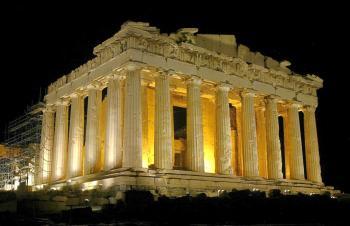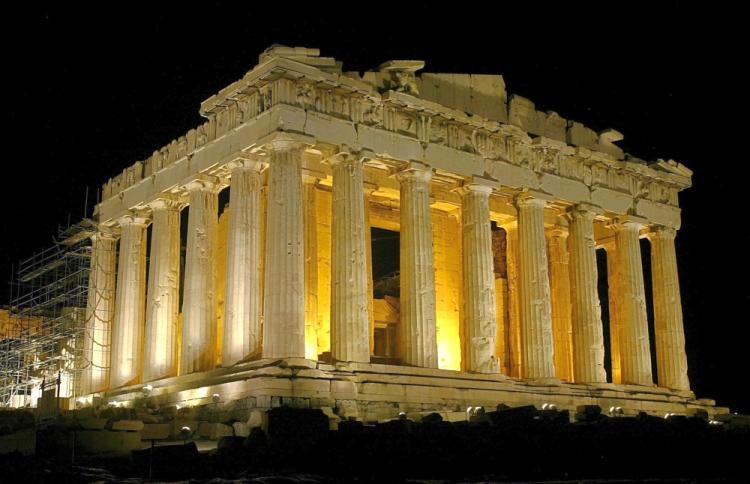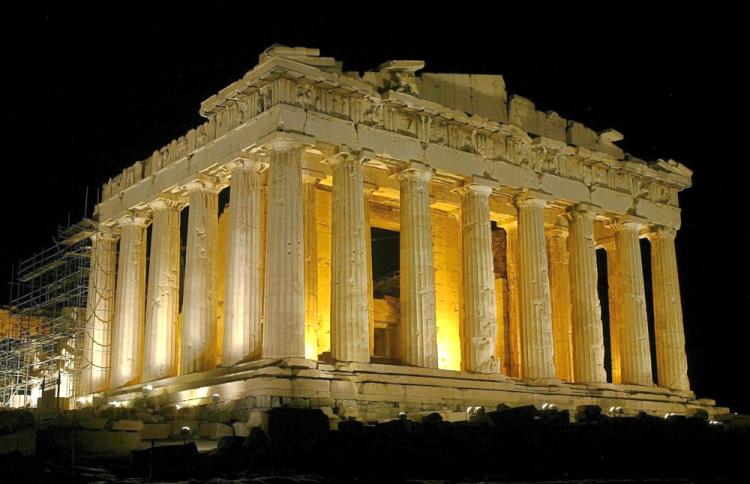ATHENS, Greece—It’s summer, and every night in the Acropolis area, the great Parthenon—a symbol of absolute symmetry and pride for what the human mind is capable of—stands illuminated, while the pedestrian streets surrounding it fill with tourists.
As I walked on a quiet street below the Acropolis, I met a schoolteacher from Los Angeles guiding a group of students. We smiled at each other, and started a conversation about the beauty of the architecture.
She said she was teaching ancient cultures to her students, and that before coming to Greece she and her students had a conversation saying they thought the ancient Greeks were geniuses because they had the ability to built things of such beauty, harmonizing mechanics and philosophy into something so perfect.
“The students asked me why the Greeks aren’t like this anymore, and why human civilization seemed to be more genius in ancient times compared to today,” she said.
I told her, “I think your students are geniuses too! They have grasped the question of the whole [of] humanity and they are so young.
“And how did you answer them?” I asked laughing.
“That ancient civilization had different values—different ways of thinking from our modern civilization—and that values are what make a society,” she said.
“You said the key word!” I said. “Of course, these kids could not turn out to be geniuses without a genius teacher.”
We both laughed.
“Did you tell them what the key value was for the ancient Greeks?” I asked.
“No.”
“Then, I think we should tell them the answer. What do you think?” I asked her.
“Yes!” she replied.
The key value for the ancient Greeks was virtue, I told her. Greek philosophers, especially Socrates, talked about virtue being the key to elevating the spirit and reaching perfection.
Socrates taught that virtue is when you avoid exaggeration, which is why a human should think logically and not be overwhelmed by his instinct.
People in ancient Greece had a deep faith in the gods, and believed that their blessings and abilities were given by the gods. In return, they wanted to thank the gods with perfection in human skill and beauty in all they created.
The percentage of people who thought this way would not have been small, as it was the way of life, I said. Evidence of Greece’s rich heritage can be found throughout the country, all decorated with ivory, gold and diamonds and columns made out of marble. From the smallest to the most obvious details, all would be richly decorated. In every piece of architecture or art, you can observe the perfect way in which the sciences harmonize all the elements of the piece: correct ratio, symmetry, mathematics, anatomy, mechanics, philosophy, astronomy, geology, geography, energy of the place, aesthetics, and so on, all working together.
The ancient Greeks always thought of the future mankind, wanting to leave them the perfect logic of science and a way of life for people.
I think everyone can feel the magnificence of this ancient building I said as we looked up at the Parthenon. Even if someone knows nothing about it, he can at least feel its beauty—and this beauty, is a testament to the world.
We seemed thankful to each other for the 20 minutes of insight. We hugged and said goodbye, then headed off in our own directions, stealing another look at the glorious Parthenon shining in the dark.
As I walked on a quiet street below the Acropolis, I met a schoolteacher from Los Angeles guiding a group of students. We smiled at each other, and started a conversation about the beauty of the architecture.
She said she was teaching ancient cultures to her students, and that before coming to Greece she and her students had a conversation saying they thought the ancient Greeks were geniuses because they had the ability to built things of such beauty, harmonizing mechanics and philosophy into something so perfect.
“The students asked me why the Greeks aren’t like this anymore, and why human civilization seemed to be more genius in ancient times compared to today,” she said.
I told her, “I think your students are geniuses too! They have grasped the question of the whole [of] humanity and they are so young.
“And how did you answer them?” I asked laughing.
“That ancient civilization had different values—different ways of thinking from our modern civilization—and that values are what make a society,” she said.
“You said the key word!” I said. “Of course, these kids could not turn out to be geniuses without a genius teacher.”
We both laughed.
“Did you tell them what the key value was for the ancient Greeks?” I asked.
“No.”
“Then, I think we should tell them the answer. What do you think?” I asked her.
“Yes!” she replied.
The key value for the ancient Greeks was virtue, I told her. Greek philosophers, especially Socrates, talked about virtue being the key to elevating the spirit and reaching perfection.
Socrates taught that virtue is when you avoid exaggeration, which is why a human should think logically and not be overwhelmed by his instinct.
People in ancient Greece had a deep faith in the gods, and believed that their blessings and abilities were given by the gods. In return, they wanted to thank the gods with perfection in human skill and beauty in all they created.
The percentage of people who thought this way would not have been small, as it was the way of life, I said. Evidence of Greece’s rich heritage can be found throughout the country, all decorated with ivory, gold and diamonds and columns made out of marble. From the smallest to the most obvious details, all would be richly decorated. In every piece of architecture or art, you can observe the perfect way in which the sciences harmonize all the elements of the piece: correct ratio, symmetry, mathematics, anatomy, mechanics, philosophy, astronomy, geology, geography, energy of the place, aesthetics, and so on, all working together.
The ancient Greeks always thought of the future mankind, wanting to leave them the perfect logic of science and a way of life for people.
I think everyone can feel the magnificence of this ancient building I said as we looked up at the Parthenon. Even if someone knows nothing about it, he can at least feel its beauty—and this beauty, is a testament to the world.
We seemed thankful to each other for the 20 minutes of insight. We hugged and said goodbye, then headed off in our own directions, stealing another look at the glorious Parthenon shining in the dark.






